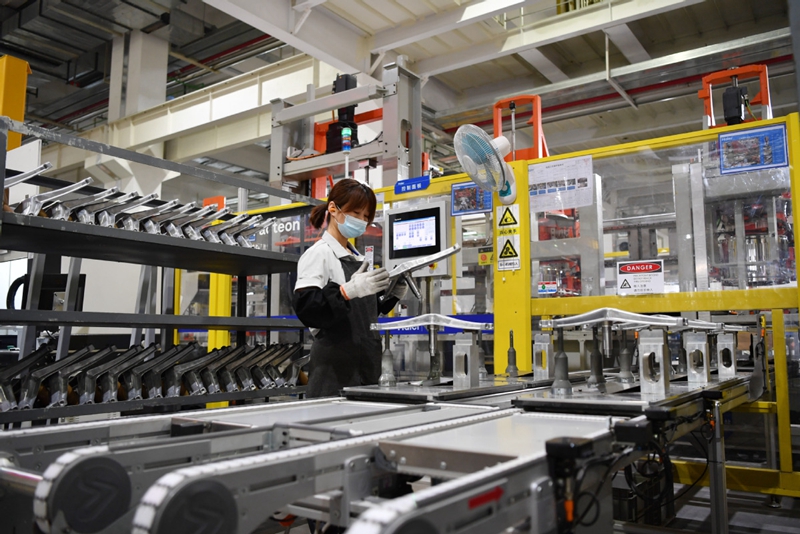
An employee checks the production line of an intelligent washing machine maker in Tianjin. LI RAN/XINHUA
Chinese enterprises' spending on digitalization services and products is expected to exceed 1 trillion yuan ($142.9 billion) for the first time this year, as companies accelerate digital transformation while battling COVID-19, a new report said.
The figure will mark a significant jump from the data in 2019, said a joint report from two government think tanks the China Center for Information Industry Development and the China International Electronic Commerce Center. Last year, the market-size of enterprises' digital procurement was 590 billion yuan, up 64 percent on a yearly basis, the report said.
With the rapid development of new technologies such as big data, cloud computing, the internet of things, blockchain and artificial intelligence, the digital economy era is accelerating and enterprise procurement is shifting from pure online purchases to systematic, full-chain procurement management and services, the report said.
Li Mingtao, head of the research institute at the China International Electronic Commerce Center, said: "The epidemic will trigger the reflection and adjustment of the supply chain system's anti-risk capabilities in various industries around the world. The digital supply chain system, driven by digital procurement, will become more efficient, diverse and resilient.
"The next stage of the intelligent supply chain can enable seamless connections between supply and demand, and force upstream enterprises in the industry chain to accelerate digital transformation. It will promote traditional industries to engage in digital collaboration on research and development, production, sales, procurement and distribution. The industrial digital era is coming," Li said.
According to him, the central government's emphasis on new infrastructure including 5G and data centers, and the construction of other major national projects will motivate companies to accelerate digital transformation. The increase in Chinese enterprises' digital procurement spending this year will be higher than that of last year, the report said.
The trend also dovetails with China's push to accelerate the integrated development of next-generation information technology and manufacturing, in a bid to foster high-quality development.
A new guideline dubbed the integrated development of the next-generation information technology and the manufacturing industry was approved earlier this month during the 14th meeting of the Central Committee for Deepening Overall Reform.
Local companies are scrambling to answer the call. Chinese tech giant Lenovo Group Ltd, for instance, is stepping up its push to help local companies accelerate intelligent transformation and unveil new tech solutions for smart cities, education, agriculture, energy, manufacturing and other sectors.
Liu Jun, president of Lenovo's China branch, said as the leading intelligent service provider, Lenovo launched the Range-wide Intelligence Services and Ecosystem strategy to help customers accelerate intelligence, jointly grasp the historical opportunities of intelligent transformation and promote the transformation of China's economic momentum.
Wu Xiaobo, a finance writer in China, said Chinese companies used to lack confidence and courage in pushing forward intelligent transformation because the industry lacked a service provider with local experiences and systematic solutions.
Foreign companies are also scrambling to jump onto the bandwagon. German software and cloud giant SAP SE, for instance, is implementing its "China Accelerators "initiative, a five-year plan that started last January to strengthen investment in the country. Mark Gibbs, president of SAP in China, said: "China is our second home. We hope that the speed and agility that cloud services bring can help our Chinese customers better survive the outbreak and emerge stronger."
|






7740f3b5-9ecb-438e-9052-76cb2d4bb671.jpg)

